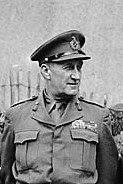General Sir Lashmer Gordon Whistler, GCB, KBE, DSO & Two Bars, DL (3 September 1898 – 4 July 1963), known as "Bolo", was a British Army officer who served in both the world wars. A junior officer during the First World War, during the Second World War he achieved senior rank serving with Field Marshal Sir Bernard Montgomery in North Africa and North-western Europe from 1942 to 1945. Montgomery considered that Whistler "was about the best infantry brigade commander I knew". In peacetime, his outstanding powers of leadership were shown in a series of roles in the decolonisation process, and he reached the four-star rank of a full general, without having attended the Staff College, Camberley, then considered almost essential for an officer wishing to attain high rank, and which a significant majority of the British generals of the war had attended. This, in Richard Mead's words, was, "proof that lacking a Staff College qualification was no barrier to advancement for the right man."[4]
- ^ Smart 2005, p. 330.
- ^ Mead 2007, p. 481.
- ^ "Press Note" (PDF). Press Information Bureau of India - Archive. 1 August 1947. Retrieved 15 February 2020.
- ^ Mead 2007, p. 484.
